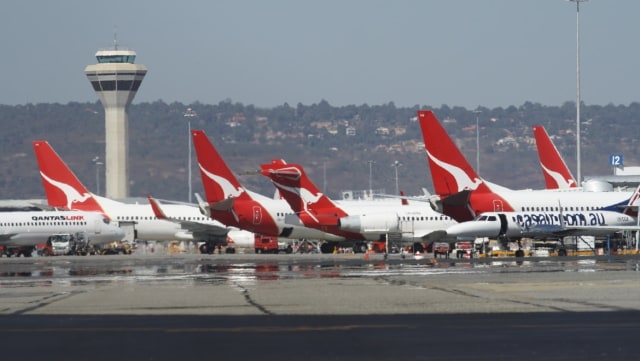
Australia’s aviation industry leaders have warned that airfares will likely soon increase, as the price of jet fuels begin to soar.
Qantas CEO Alan Joyce has said that Qantas fares will increase by 7 per cent initially to account for increasing oil costs, however, could see further price hikes in the future.
Speaking at the Australian Financial Review Business Summit on Tuesday, Joyce revealed that the airline has hedged around 90 per cent of the fuel it needs through to the end of June, and 50 per cent of its requirements for the September quarter.
“(Hedging) gives us time to react to that higher fuel price,” he said. “Unfortunately, if we stay at these levels, airfares are going to have to go up, we’re going to have to pass them on.”
At the current cost for jet fuel, of around US$120 a barrel (AU$164), the pass-on cost is 7 per cent.
“It’s not massive but it will have an impact on some levels of travel out there. If it moves further, for every US$4 on the barrel, it’s another per cent that airfares have to improve by,” Joyce said.
He pointed out that motorists had it much tougher, with petrol prices up 30 per cent in response to the high cost of oil.
It comes as oil prices reached a 14-year high on Monday before falling slightly on Tuesday, as tensions in Europe continue to exacerbate the escalating cost of oil and gas.
While the US has considered imposing sanctions on the import of Russian oil, Europe has largely rejected the idea, due to its reliance on Russian resources.
Meanwhile, Flight Centre managing director Graham Turner warned that passengers could soon face a 10-15 per cent jump in airfares, should oil prices touch US$200 a barrel.
“My guess is with airline capacity increasing, we should get back to pre-COVID international airfares over the next six months, but the cost of fuel could put 10-15 per cent on an airfare,” he told The Australian.
Turner said that increasing fares are unlikely to deter international travellers, however, rising tensions in Europe could do so.
“If it settles down, travel will go up, but if it gets worse, people will be more reluctant to travel. If the situation remains the same, people will get used to it and will still travel,” he said.
“Most of us have become fairly resilient now in terms of our business,” Turner said of the airline and travel industry.
“The only thing that would worry me now is all-out European war, which is probably slim but it’s still an outside chance.”
It comes after the ACCC released its latest Airline Competition in Australia report, which revealed that domestic airfares have been falling in light of Rex’s entrance into the capital city domestic market.
According to ACCC chair Rod Sims, the addition of Rex into the domestic airline market has driven down prices for consumers and driven further competition between incumbent players.
“The Australian domestic airline industry has predominantly been a duopoly since deregulation 30 years ago, but we now have three airline groups competing on some of Australia’s busiest routes,” Sims said.
“We’ve seen significant price reductions on these routes due to increased competition,” he said.
“Each airline is working hard to win over consumers and as they continue fighting for market share, we can expect competitive airfares, improved connectivity, and better products and services.”
The ACCC also revealed that Virgin Australia carried more passengers than rivals Qantas, Jetstar and Rex in January, claiming 34 per cent of the passenger market in January, up from 33 per cent in October 2021.
The figure surpasses Virgin’s long-held target since exiting administration in November 2020 to achieve and hold onto 33 per cent of domestic market share. Virgin boasted just 22 per cent share in November 2020.
Qantas and Jetstar each claimed 31 per cent of the month’s domestic passenger market share, sending the Qantas Group’s collective share to just 62 per cent, well below the Group’s target of 70 per cent.
Rex’s share has remained steady since October 2021 at 4 per cent.
















Ashley
says:That’s one of the costs of war; everyone has to pay.
Expect fares to rise with other airlines’, too.
Jeffrey
says:Airlines hedge their fuel prices, so any immediate fuel price rise would just be price gouging, but who would be surprised if they tried???
Vannus
says:Not all airlines’ here fuel hedge as (a) don’t have spare funds to buy at optimum time, & (b) don’t have the storage capacity for huge amounts of ‘spare’ fuel.
QANTAS has both, & has fuel hedged for decades’.